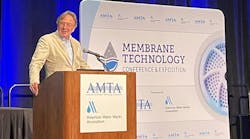WASHINGTON, DC, Apr. 18, 2012 -- Under a comprehensive settlement with EPA and other federal and state agencies, Memphis has agreed to make improvements to its sewer systems to eliminate unauthorized overflows of untreated raw sewage. Memphis estimates such work will cost approximately $250 million.
A consent decree, filed this week in U.S. District Court for the Western District of Tennessee in Memphis, represents the combined efforts of the United States and the state of Tennessee, co-plaintiffs in this settlement, and the Tennessee Clean Water Network, an intervening plaintiff in this action. The United States and Tennessee previously filed a complaint against Memphis on February 5, 2010, seeking injunctive relief and civil penalties for Memphis' alleged violations of the Clean Water Act and the Tennessee Water Quality Control Act.
The major features of the consent decree will require Memphis to implement specific programs designed to ensure proper management, operation and maintenance of its sewer systems to eliminate unauthorized overflows of untreated raw sewage. In order to address the problem of grease buildup within the sewer lines, Memphis developed and will be required to implement a comprehensive fats, oil and grease (FOG) program. Furthermore, the consent decree will require Memphis to develop and implement a continuing sewer assessment and rehabilitation program to ensure that the integrity of sewer infrastructure is appropriately maintained to prevent system failures that would likely result in unauthorized overflows. The consent decree will also require Memphis to perform corrective measures in certain specifically identified priority areas.
In addition to the control requirements, the consent decree will also require Memphis to pay a civil penalty of $1.29 million. Half of this amount will be paid to the United States. At the direction of the state, the other half of the civil penalty will be paid by Memphis through the performance of certain state projects. These projects include implementation of improvements to Memphis' Geographic Information System (GIS) and implementation of an effluent color study to better delineate limits for the color of Memphis' permitted discharges into the Mississippi River.
"EPA is working with communities across country to address sewage overflows that negatively impact the health of residents and impair local water quality," said Cynthia Giles, assistant administrator for EPA's Office of Enforcement and Compliance Assurance. "This collaborative agreement with the city of Memphis will reduce raw sewage overflows, protecting area waterways now and into the future."
"The improvements required by this settlement agreement will bring lasting public health and environmental benefits to Memphis residents," said Ignacia S. Moreno, assistant attorney general for the Justice Department's Environment and Natural Resources Division. "We will continue to work in partnership with EPA to enforce the Clean Water Act and work with municipalities across the country to advance the goal of clean water for all communities."
Keeping raw sewage and contaminated stormwater out of the waters of the United States is one of EPA's national enforcement initiatives for 2011 to 2013. The initiative focuses on reducing sewer overflows, which can present a significant threat to human health and the environment. These reductions are accomplished by obtaining cities' commitments to implement timely, affordable solutions to these problems, including the increased use of green infrastructure and other innovative approaches.
The United States has reached similar agreements in the past with numerous municipal entities across the country including Mobile and Jefferson County, Ala. (Birmingham); Atlanta and Dekalb County, Ga.; Knoxville and Nashville, Tenn.; Miami-Dade County, Fla.; New Orleans; Hamilton County (Cincinnati), Ohio; Northern Kentucky Sanitation District #1; and Louisville, Ky.
The proposed consent decree with Memphis is subject to a 30-day public comment period and final court approval.
More about the settlement:
www.epa.gov/compliance/resources/cases/civil/cwa/memphis.html
More information about EPA's national enforcement initiative: http://www.epa.gov/compliance/data/planning/initiatives/2011sewagestormwater.html
###


